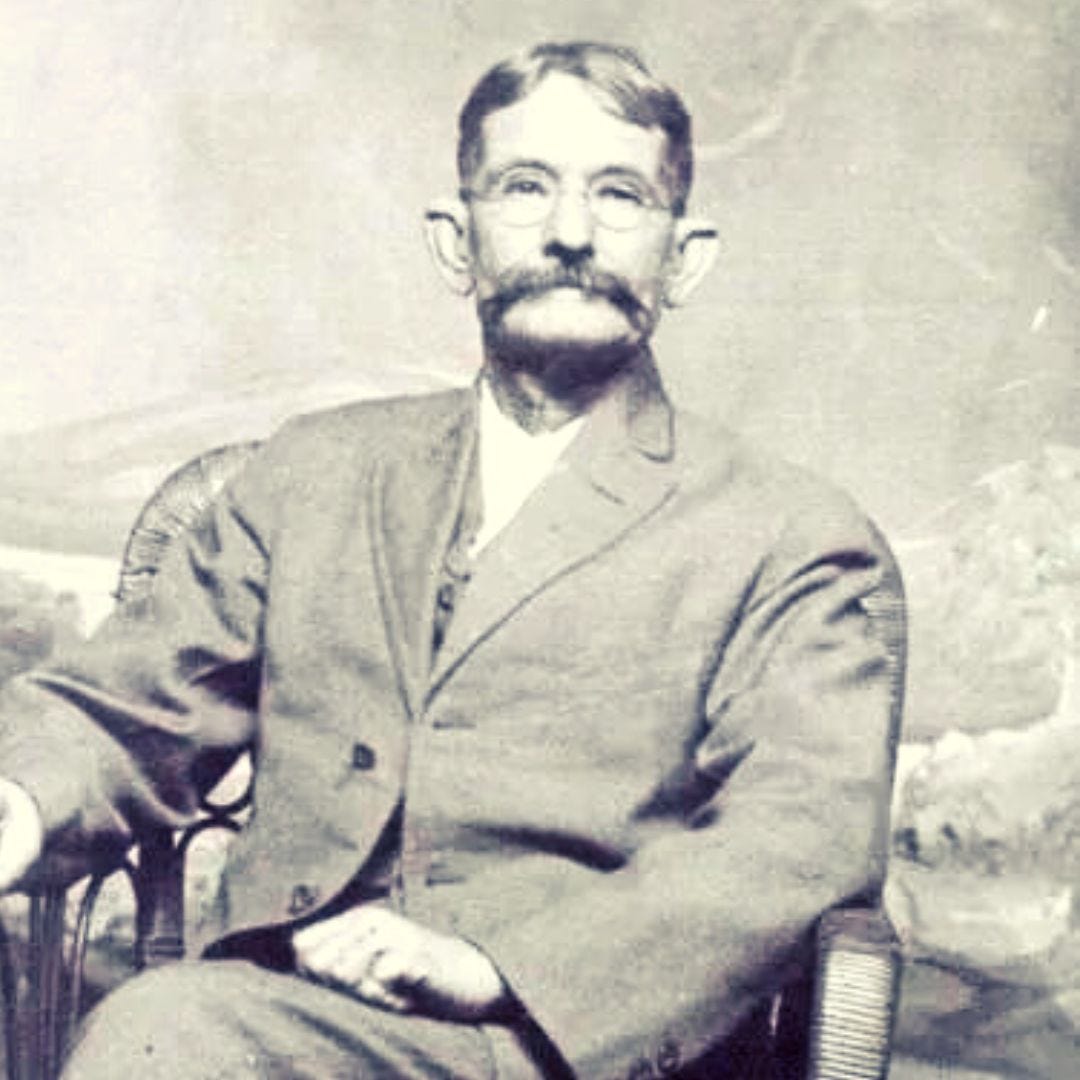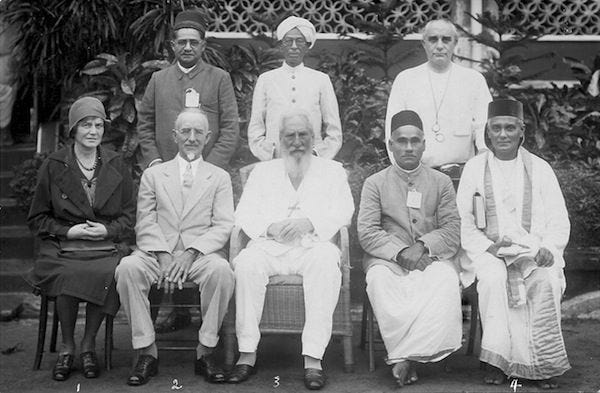Doc Scurlock
The thinking man's outlaw
Josiah “Doc” Scurlock was a poet, a philosopher, and an all-around intellectual. He also a battle-scarred killer of men who once rode with the most notorious outlaw of all time.
Doc was a man to be reckoned with long before the Lincoln County War. He had already survived a bullet to the face, numerous Indian attacks, cattle stampedes, rustlers, and rogue lawmen long before he ever met William H. Bonney. And ole Doc wasn’t above snatching alleged rustlers out of jail and hanging ‘em from the nearest convenient tree, either.
However, Scurlock would call it quits on the outlaw life shortly after the troubles in Lincoln. He moved his small family to Fort Sumner and, save for a couple of excursions into Texas with some of Mr. Chisum’s borrowed beeves, he sank into an honest life.
Doc may have been present in February of 1879 when Billy met with Dolan and Jesse Evans, looking to call a truce. And Doc was with The Kid later that spring and early summer as the two were “incarcerated” in Lincoln, awaiting Governor Wallace’s pardon. When that pardon never came, they simply rode out of town.
Billy to his grave and Doc to Texas. Potter County, Texas to be exact.
By either October or December of 1879 Scurlock sold off all his guns, save for an old squirrel rifle, and moved the family to Texas Panhandle where he took up employment on the LX Ranch and later at the mail station in nearby Wheeler.
Not for long, though. Whether in an attempt to outrun his past or just looking to find the best life for his family, Josiah Scurlock seemed to always be on the move. By 1881 he was teaching school in the town of Vernon, in North Texas, and by 1893 he was plowing his very own cotton farm just south of Fort Worth. Throughout it all, Doc always supplemented his income teaching Spanish. He had spent a considerable amount of time in Old Mexico, after all, and happily married to a Hispanic woman.
Unfortunately, Doc and his wife Antonia knew the gut-wrenching sting of losing a child. His oldest daughter passed away while the family still resided at Fort Sumner, and he’d lose yet another – 5-year-old Viola – in 1894.
1899 would find the Scurlock family in Granbury, Texas for the better part of a decade before relocating to Mabank, a little over a hundred miles to the east, where tragedy would strike yet again. In November of 1912, Doc said goodbye to Antonia after 38 years of faithful marriage. True to their vows, the couple didn’t part until death.
Scurlock continued to teach Spanish in Mabank, along with a little bookmaking, but his past came calling. For possibly the first time ever, Doc was approached by a reporter. The journalist was hoping to interview Scurlock about his various adventures with Billy the Kid, but Doc refused.
That life was behind him.
1916 saw Doc lose yet another daughter, Lola, and three years later he would move for a final time, this time settling in Eastland, Texas.
In Eastland Doc operated a confectionary store (I believe this is old timey speak for a candy shop) and spent an enormous amount of time at the local library. Always a voracious reader, Scurlock couldn’t soak up knowledge quick enough. The man was a deep thinker, always questioning the world around him and looking to help make sense of the chaos.
As such it was only natural that Doc be admitted into the prestigious Theosophical Society.
The Theosophical Society is still around to this day and have listed among their ranks such noted intellectuals as Thomas Edison and the poet Yeats. Per their website, they define theosophy - as derived from Greek roots meaning “divine wisdom,” - as a body of knowledge that tells us about our place in the universe and why the world is the way it is. Although it agrees in many respects with scientific theories, it goes past them in addressing unseen realities that we all experience, but often don’t understand. It answers many questions that people have, such as:
Why am I here? What is the purpose of the universe? Is there a God? Why does there seem to be injustice and evil in the world? And, how can I have a purposeful and meaningful life?
Deep stuff for an old cowhand used to dodging bullets and sleeping out in the desert. But then again, Doc was the thinking man’s bandit.
Scurlock worked for a time for the Texas State Highway Department but retired in 1925 at the age of 76, after which he travelled and visited family, staying with his various surviving children sometimes as long as months at a time.
Finally on July 25th, 1929, - at 79 years of age - Josiah “Doc” Scurlock passed away. He’s buried in Eastland where his wife Antonia was later reinterred. The pair had 10 children all total, only 6 of whom survived their parents.
As I mentioned toward the beginning, Doc dabbled in poetry. I thought about posting some of his work here - it’s really not bad at all - but instead I think I’d like to share his words to a grieving child. Upon learning that his grandson had passed away, Scurlock penned the following to his daughter Linda:
I just received a letter from Amy this morning bringing the news of little Wilbur’s death. It was a great shock to me, and I fain would say something that would in some measure console you for your great loss, but we all know that words of consolation and sympathy sound very meaningless in a case of this kind. About all we can say is that it is a trial that we ought to be prepared to meet, for it is the one thing we must all meet sooner or later. It comes to us all, young or old, high or low. When our child is born, we know but one thing as to its future and that is it must die. Now I can but believe that whatever is, is best. We can’t understand always, but time shows us that all is for the best. What the final outcome of it all is to be, no one knows. There are and yet will be many guesses, but no one knows. But whatever it may be you may be assured it will be best, for the supreme intelligence that governs the universe makes no mistake.
If I was in shape so I could, I would come and spend a few days with you but don’t see how I can just now. I have just finished taking a course of treatment for my kidney trouble and rheumatism and am much impaired in health, but my bank account is at low ebb, so I must go to work again.
Let me hear from you soon. I will come to see you just as soon as I can get off. Be brave and bear your sorrow with fortitude is all that I can advise.
Your affectionate Papa
I found this very interesting, for a myriad of reasons. Firstly, Doc is speaking sincerely. Not just as a father whose heart is clearly breaking for his grieving daughter, but also as someone who knew firsthand the bitter soul-crushing punch gut that is losing a child of your own.
It also shows that Doc was a bit of a stoic. Much like Marcus Aurelias, Scurlock accepted life as it was, on life’s terms and learned to “live in agreement with nature”. He knew, more than anyone, just how fleeting and often times cheap life can be.
I can’t prove this, of course, but I suspect Doc was familiar with the Latin phrase memento mori - remember, you too shall die.
If you’d like to learn more about the life and times of Doc Scurlock, I highly recommend the book Blood on the Saddle, by David Garrett and Mica Pharis. Both authors are descendants of Scurlock’s and have a wealth of information to share. Everything from family photos, to letters, and even Doc’s poetry. Very interesting stuff and absolutely worth it if you’re a big-time fan of all things Billy the Kid.
Speaking of Billy the Kid - If you’re a new subscriber and aren’t aware, I host a show called The Wild West Extravaganza. Each episode takes a look at real life people and events from the old west era, and I’ve just started a new series on Billy the Kid.
You can check out the first installment right here and don’t worry, there’s plenty of Doc Scurlock talk on the rest of the series! Thanks for reading!




Thank you Josh. Very interesting.
Indeed, we should never judge a book by its cover. Thank you sir.